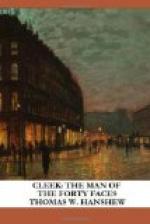“Indeed? And who may he be, Mr. Van Nant?”
“The great, the amazing, the undeceivable man, Cleek. He’d get at the truth of it. Nothing could baffle and bewilder him. But—oh, well, it’s the old, old tale of the power of money. He wouldn’t take the case—a high-and-mighty ‘top-notcher’ like that—unless the reward was a tempting one, I’m sure.”
“No, I’m afraid he wouldn’t,” agreed Cleek, with the utmost composure. “So you must leave him out of your calculations altogether, Mr. Van Nant. And now, if you don’t mind accompanying us and showing the chauffeur the way, perhaps Mr. Narkom will take us over to your house in his motor.”
“Mind? No, certainly I don’t mind. Anything in the world to get at a clue to this thing, Mr. Headland, anything. Do let us go at once.”
Cleek led the way from the room. Halfway down the stairs, however, he excused himself on the plea of having forgotten his magnifying glass, and ran back to get it. Two minutes later he rejoined them in the little drawing-room, where the growling Captain was still demanding the whole time and attention of his daughter, and, the motor being ready, the three men walked out, got into it, and were whisked away to the house which once had been the home of the vanished George Carboys.
It proved to be a small, isolated brick house in very bad condition, standing in an out-of-the-way road somewhere between Putney and Wimbledon. It stood somewhat back from the road, in the midst of a little patch of ground abounding in privet and laurel bushes, and it was evident that its cheapness had been its chief attraction to the two men who had rented it, although, on entering, it was found to possess at the back a sort of extension, with top and side lights, which must have appealed to Van Nant’s need of something in the nature of a studio. At all events, he had converted it into a very respectable apology for one; and Cleek was not a little surprised by what it contained.
Rich stuffs, bits of tapestry, Persian draperies, Arabian prayer-mats—relics of his other and better days and of his Oriental wanderings—hung on the walls and ornamented the floor; his rejected pictures and his unsold statues, many of them life-sized and all of clay, coated with a lustreless paint to make them look like marble, were disposed about the place with an eye to artistic effect, and near to an angle, where stood (on a pedestal, half concealed, half revealed by artistically arranged draperies) the life-size figure of a Roman senator, in toga and sandals, there was the one untidy spot, the one utterly inartistic thing the room contained.




